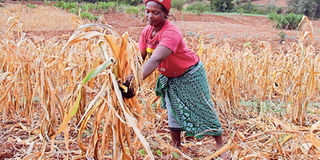Brief news on farming and agribusiness in the country

A woman cuts dry maize stalks. North Rift maize farmers are counting losses as most crops have not germinated due to little rain. FILE PHOTO | NMG
What you need to know:
- Mr William Koros, an Endebess farmer, said maize production would fall drastically this year.
- Dr Desai urged private organisations to invest in the industry in order to increase competitiveness and productivity.
- Agriculture accounts for around a quarter of greenhouse gas emissions. Cattle, which produce significant quantities of methane and nitrous oxide, are among the biggest contributors.
- Rumensin™ 200 was launched in the country by Elanco Animal Health Inc, a company that develops products and knowledge services to prevent and treat disease in food animals and pets.
Cost of producing maize to double as drought persists, farmers say
North Rift maize farmers are counting losses as most crops have not germinated due to little rain. A majority of these farmers have replanted their crop.
Mr Peter Kutit, a large-scale seed grower, said 200 of his 400 acres had been destroyed.He added that the weather reports keep changing and that farmers are not sure if there will be enough rains.
“The cost of production has gone up high by 100 per cent. Preparing the land cost us a fortune but it has not rained and the crops have not germinated,” Mr Kutit said in Birunda.
Mr William Koros, an Endebess farmer, said maize production would fall drastically this year.
“Anyone who planted in March and April will get nothing. Because of the prices offered by the government last year, most farmers sold their maize at throwaway prices. It discouraged many from growing maize,” Mr Koros said, adding that he has diversified to coffee and grass.
-Gerald Bwisa
****
State sets aside Sh1.2bn for cotton development in Kisumu
The government has set aside Sh1.2 billion for the revival of the cotton industry in Kisumu through training.
Vocational and Technical Training Principal Secretary Kevit Desai said cotton value-addition would begin right from cultivation to the fashion exhibition stage.
“The idea is to develop cluster of TVETs, which directly benefit from the project. These institutions will exploit the latest technology and work with technicians in the vast textile industry in the region,” Dr Desai said.
He added that cotton revival would open up new and old enterprises and promote science and technology.
Dr Desai urged private organisations to invest in the industry in order to increase competitiveness and productivity.
“We hope stakeholders and private firms will invest their skills and knowledge in factories, machinery and technology,” he said.
-Elizabeth Ojina
****
Artificially grown beef harmful to environment, study shows
Artificially grown beef could generate longer-lasting and more damaging greenhouse gases than rearing cattle normally, a new study shows.
Agriculture accounts for around a quarter of greenhouse gas emissions. Cattle, which produce significant quantities of methane and nitrous oxide, are among the biggest contributors.
The demand for beef has seen vast tracts of land turned into pasture, many of which have to be fertilised with nitrogen-based products.
One touted solution to reducing the environmental impact of beef production is artificially grown meat. Several firms are developing lab-grown beef, pork, poultry and seafood.
But while a move to this means of production could reduce methane levels from herds quickly, the research, published in the journal Frontiers in Sustainable Food Systems suggests over a longer time frame, production of lab-grown meat could generate greater concentrations of damaging carbon dioxide.
-Agencies
****
Firm launches dairy feeds additive in global drive to shore up milk production
A new animal feed additive has been launched to boost production in dairy cattle.
Rumensin™ 200 will be used by manufacturers to fortify feed, enabling dairy cattle to generate more energy and have better food absorption. This in turn will increase milk production.
Rumensin™ 200 was launched in the country by Elanco Animal Health Inc, a company that develops products and knowledge services to prevent and treat disease in food animals and pets.
It was developed in partnership with Ultravetis EA Ltd, a Kenyan company that supplies farmers with veterinary, animal health and hygiene products as well as seeds and services.
Rumensin™ 200 medicinal food, according to Elanco’s officials, will be available to animal feed manufacturers through the East Africa Growth Accelerator project, through which Elanco, together with the Bill and Melinda Gates Foundation, have been supporting dairy farmers.
“We are pleased to announce the launch of Rumensin™ 200, a proven product that will make dairy farming more profitable through healthier cattle and improved production,” Andre Westerveld, Elanco’s country director for South Africa and Sub-Sahara, said.
He added that Rumensin™ 200 would enhance the lactating and dry cow energy status with better health and improved milk production efficiency, which will result in less treatment costs and higher milk production.
Ultravetis Group chairman Wachira Mureithi said the company’s goal was to provide the most innovative technology for maximum benefits to Kenyan farmers.
-Brian Okinda





